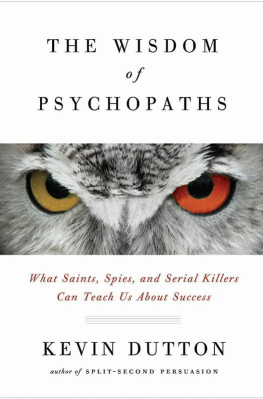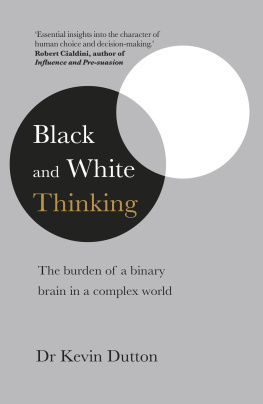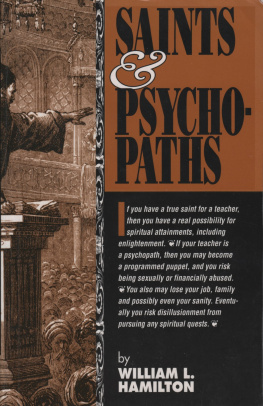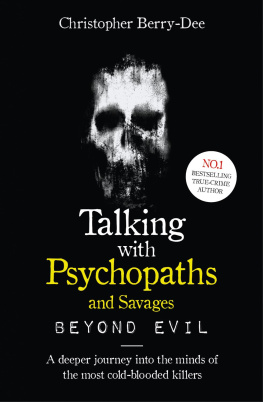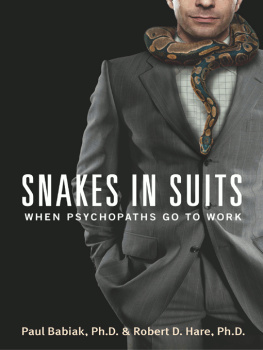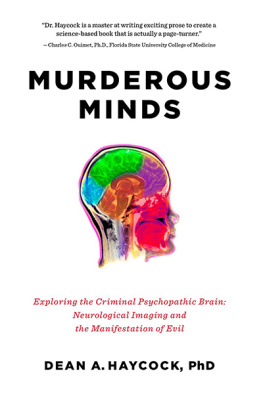ALSO BY KEVIN DUTTON Split-Second Persuasion:
The Ancient Art and New Science of Changing Minds

Copyright 2012 Kevin Dutton
All rights reserved. The use of any part of this publication, reproduced, transmitted in any form or by any means electronic, mechanical, photocopying, recording or otherwise, or stored in a retrieval system without the prior written consent of the publisheror in the case of photocopying or other reprographic copying, license from the Canadian Copyright Licensing Agencyis an infringement of the copyright law.
Doubleday Canada and colophon are registered trademarks
Library and Archives Canada Cataloguing in Publication
Dutton, Kevin
The wisdom of psychopaths / Kevin Dutton.
eISBN: 978-0-385-67719-6
1. Psychopaths. 2. Antisocial personality disorders.
I. Title.
RC555.D88 2012 616.8582 C2012-902425-2
An excerpt from originally appeared, in slightly different form, in Scientific American .
Grateful acknowledgment is made for permission to reprint excerpts from the following previously published material:
Eysencks personality model: with kind permission from Springer Science+Business Media.
The Lesson of the Moth, from Archy and Mehitabel by Don Marquis, copyright 1927 by Doubleday, a division of Random House, Inc. Used by permission of Doubleday, a division of Random House, Inc.
Jacket photograph: Shutterstock
Published in Canada by Doubleday Canada,
a division of Random House of Canada Limited
www.randomhouse.ca
v3.1
In memory of John Richard Dutton The mind is its own place, and in itself
Can make a heavn of hell, a hell of heavn. PARADISE LOST 1: 254255
CONTENTS
PREFACE
My father was a psychopath. It seems a bit odd saying that now, looking back. But he was. No question. He was charming, fearless, ruthless (but never violent). And he had about as much going on in the conscience department as a Jeffrey Dahmer freezer. He didnt kill anyone. But he certainly made a few killings.
Its a good thing genes arent everything, right?
My father also had an uncanny knack for getting exactly what he wanted, often with just a casual throwaway line or a single telling gesture. People used to say that he looked like the scheming Del Boy in Only Fools and Horses which he didnot just acted like him, which he also did (he, too, was a market trader).
The BBC sitcom could have been a Dutton family video.
I once remember helping Dad sell a load of datebooks at Petticoat Lane Market, in Londons East End. I was ten at the time, and it was a school day. The datebooks in question were a collectors item. They only had eleven months.
You cant sell these, I protested. Theres no January!
I know, he said. Thats why I forgot your birthday.
Unique opportunity to get your hands on an eleven-month diary, folks sign up for a special two-for-one offer and get an extra month thrown in next year for free
We unloaded the whole damn lot.
Ive always maintained that Dad was in possession of pretty much the ideal personality for modern living. I never once saw him panic. Never once saw him lose his cool. Never once saw him get hot under the collar about anything. And believe me, there were plenty of times when he might have.
They say that humans developed fear as a survival mechanism to protect against predators, he once told me. But you dont see too many saber-toothed tigers prowling round Elephant and Castle, now do you, boy?
He was right. I certainly hadnt seen any. There were a few snakes, maybe. But everyone knew who they were.
For a long time, growing up, I used to think of Dads bon mot as just another of his market-stall one-linershere today, gone tomorrow. A bit like a lot of the crap he used to sell, funnily enough. But now, years later, I realize that there was actually a deep biological truth to what the crafty old guy was saying. In fact, he anticipated the position taken by modern evolutionary psychologists with uncanny, sublime precision. We humans, it appears, did indeed develop our fear response as a survival mechanism to protect against predators. Monkeys with lesions of the amygdala, for instancethe brains emotional sorting officedo very stupid things, like trying to pick up cobras.
But millions of years on, in a world where wild animals arent lurking around every street corner, this fear system can be oversensitivelike a nervous driver with a foot hovering constantly over the brake pedalreacting to dangers that dont actually exist and pushing us into making illogical, irrational decisions.
There was no such thing as stock in the Pleistocene era, George Loewenstein, professor of economics and psychology at Carnegie Mellon, points out. But human beings are pathologically risk averse. A lot of the mechanisms that drive our emotions arent really that well adapted to modern life.
I prefer my dads version.
The observation that modern-day humans are pathologically risk averse does not, needless to say, mean that this has always been the case. In fact, it might even be argued that those of us today who are clinically risk aversethose of us, for instance, who suffer from chronic anxietysimply have too much of a good thing. During the time of our ancestors, the existence of individuals who were hypervigilant to threat may well, evolutionary biologists suggest, have been decisive in the fight against predatorsand from this point of view, anxiety would undoubtedly have served as a considerable adaptive advantage. The more sensitive you were to rustlings in the undergrowth, the more likely youd have been to have kept yourself, your family, and your extended group members alive. Even today, anxious individuals are better than the rest of us at detecting the presence of threat: slip an angry face in among a display of happy or neutral faces on a computer screen and anxious people are far faster at picking it out than those who are non-anxiousnot a bad ability to fall back on should you happen to find yourself alone at night and wandering around an unfamiliar neighborhood. Being anxious can sometimes be useful.
The notion that a mental disorder can occasionally come in handyconferring extraordinary, outlandish advantages, as well as inordinate distress, on its sufferersis hardly new, of course. As the philosopher Aristotle observed more than 2,400 years ago, There was never a genius without a tincture of madness. In most peoples minds, this link between genius and madness is probably most apparent, thanks to the box-office success of the films Rain Man and A Beautiful Mind , when it comes to autism and schizophrenia. In his book The Man Who Mistook His Wife for a Hat , the neurologist and psychiatrist Oliver Sacks reports a famous encounter with the twins. Profoundly autistic, John and Michael, then twenty-six, were living in an institution. When a box of matches spilled onto the floor, both of them simultaneously called out 111. As Sacks gathered up the matches, he started counting
On a similar note, the well-worn stereotype of the brilliant tortured artist is also not without foundation. The painter Vincent van Gogh, the dancer Vaslav Nijinsky, and the father of game theory (of which more later) John Nash were all psychotic. Coincidence? Not according to Szabolcs Kri, a researcher at Semmelweis University in Budapest, who appears to have uncovered a genetic polymorphism associated with both schizophrenia and creativity. Kri has found that people with two copies of a particular single-letter DNA variation in a gene called neuregulin 1 , a variation that has been previously linked to psychosisas well as poor memory and sensitivity to criticismtend to score significantly higher on measures of creativity compared with individuals who have one or no copy of the variation. Those with one copy also tend to be more creative, on average, than those without.
Next page
